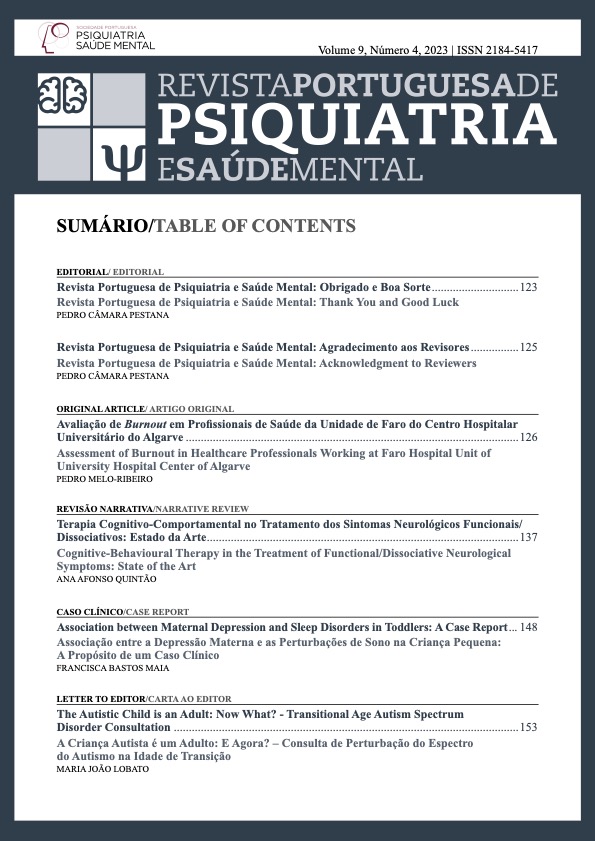Assessment of Burnout in Healthcare Professionals Working at Faro Hospital Unit of University Hospital Center of Algarve
DOI:
https://doi.org/10.51338/rppsm.532Keywords:
Burnout, Professional, Burnout, Psychological, Occupational Stress, Health Personnel, PortugalAbstract
Introduction: Healthcare professionals are a particularly susceptible group to the development of burnout. There are few published studies evaluating the levels of burnout among healthcare professionals at Faro Hospital Unit of the University Hospital Center of Algarve. This study aims at assessing the prevalence of this syndrome, in its various definitions and dimensions, in the studied population and its different professional classes, as well as identifying sociodemographic or labor-related factors associated to higher levels of burnout.Methods: We conducted an observational, cross-sectional and quantitative study on healthcare professionals at Faro Hospital Unit. The collected data included sociodemographic information and details related to professional performance. We utilized the validated Portuguese versions of the Maslach Burnout Inventory – Human Services Survey and the 23-QVS Stress Vulnerability Questionnaire.
Results: The total of 200 responses comprises 88 nurses, 83 doctors, and 29 health technicians. The average age was 39 years, with a majority being female (75.5%). We identified a prevalence of burnout of 16.5% (nurses: 23.9%; doctors: 10.8%; health technicians: 10.3%). High levels of emotional exhaustion, depersonalization and reduced professional achievement were recognized in, respectively, 68.5%, 30% and 34.5% of professionals. The median response for 23-QVS was 39 points, with vulnerability to stress (>43 points) being found in 37% of the sample. Professionals with high levels of emotional exhaustion worked an average of 5 more hours a week. The increase in average working hours was associated with a higher risk of high emotional exhaustion and depersonalization. Vulnerability to stress was linked to an increased risk of high levels of burnout dimensions. Being a nurse was associated with a higher risk of burnout and high levels of its dimensions.
Conclusion: This study showed high levels of burnout in a considerable proportion of professionals, particularly in nurses. Medians of burnout dimensions corresponded to high levels of emotional exhaustion and depersonalization and moderate levels of reduced professional achievement, although this population did not score, in median, for vulnerability to stress. These results reinforce the importance of creating a consultation on burnout among healthcare professionals at Faro Hospital Unit of the University Hospital Center of Algarve.
Downloads
References
Freudenberger HJ. Staff Burn-Out. J Soc Issues. 1974;30:159-65. doi: 10.1111/j.1540-4560.1974. tb00706.x. 13.
McCray LW, Cronholm PF, Bogner HR, Gallo JJ, Neill RA. Resident physician burnout: is there hope? Fam Med. 2008;40:626-32.
Maslach C, Jackson SE. The measurement of experienced burnout. J Organ Behav. 1981;2:99-113. doi: 10.1002/job.4030020205.
Maslach C, Jackson SE, Leiter M. Maslach Burnout Inventory Manual. 3rd ed. Palo Alto: Consulting Psychologists Press; 1996.
Maslach C, Leiter MP. Understanding the burnout experience: recent research and its implications for psychiatry. World Psychiatry. 2016;15:103-11. doi: 10.1002/wps.20311. 16.
World Health Organization. International Statistical Classification of Diseases and Related Health Problems. 11th ed. Geneve: WHO; 2019.
West CP, Dyrbye LN, Shanafelt TD. Physician burnout: contributors, consequences and solutions. J Intern Med. 2018;283:516-29. doi: 10.1111/joim.12752.
Bianchi R, Schonfeld IS, Laurent E. Burnout–depression overlap: A review. Clin Psychol Rev. 2015;36:28-41. doi: 10.1016/j.cpr.2015.01.004.
Center C, Davis M, Detre T, Ford DE, Hansbrough 18. W, Hendin H, et al. Confronting Depression and Suicide in Physicians: A Consensus Statement. JAMA. 2003;289:3161. doi: 10.1001/jama.289.23.3161.
Wang Z, Xie Z, Dai J, Zhang L, Huang Y, Chen B. Physician Burnout and Its Associated Factors: A Cross-sectional Study in Shanghai. J Occup Health. 19. 2014;56:73-83. doi: 10.1539/joh.13-0108-oa.
Rotenstein LS, Torre M, Ramos MA, Rosales RC, Guille C, Sen S, et al. Prevalence of Burnout 20. Among Physicians: A Systematic Review. JAMA. 2018;320:1131. doi: 10.1001/jama.2018.12777.
Hiver C, Villa A, Bellagamba G, Lehucher-Michel 21. MP. Burnout prevalence among European physicians: a systematic review and meta-analysis. Int Arch Occup Environ Health. 2022;95:259-73. doi: 10.1007/ s00420-021-01782-z.
Marcelino G, Cerveira JM, Carvalho I, Costa JA, Lopes M, Calado NE, et. Burnout levels among Portuguese family doctors: a nationwide survey. BMJ Open. 2012;2: e001050. doi: 10.1136/bmjopen-2012-001050.
Marôco J, Marôco AL, Leite E, Bastos C, Vazão MJ, Campos J. Burnout in Portuguese Healthcare Professionals: An Analysis at the National Level. Acta Méd Port. 2016;29:24-30. doi: 10.20344/amp.6460.
Bykov, KV, Zrazhevskaya IA, Topka EO, Peshkin VN, Dobrovolsky AP, Isaev RN, et al. Prevalence of burnout among psychiatrists: A systematic review and meta-analysis. J Affect Disord. 2022;308:47-64. doi: 10.1016/j.jad.2022.04.005.
Antao HS, Sacadura-Leite E, Correia AI, Figueira ML. Burnout in hospital healthcare workers after the second COVID-19 wave: Job tenure as a potential protective factor. Front Psychol. 2022;13. doi: 10.3389/ fpsyg.2022.942727.
Duarte I, Teixeira A, Castro L, Marina S, Ribeiro C, Jácome C, et al. Burnout among Portuguese healthcare workers during the COVID-19 pandemic. BMC Public Health. 2020;20:1885. doi: 10.1186/ s12889-020-09980-z.
Duarte I, Pinho R, Teixeira A, Martins V, Nunes R, Morgado H, et al. Impact of COVID-19 pandemic on the mental health of healthcare workers during the first wave in Portugal: a cross-sectional and correlational study. BMJ Open. 2022;12: e064287. doi: 10.1136/ bmjopen-2022-064287.
Pereira J, Nave F. O Burnout nos profissionais de saúde do Centro Hospitalar do Algarve – Unidade de Faro. [Dissertação]. Faro: Universidade do Algarve; 2017.
Vaz-Serra A. Construção de uma escala para avaliar a vulnerabilidade ao stress: a 23 QVS. Psiquiatr Clin. 2000;21:279-308.
Mata C, Machado S, Moutinho A, Alexandra D. Estudo PreSBurn: prevalência de síndroma de burnout nos profissionais dos cuidados de saúde primários. Rev Port Med Geral Fam. 2016;32:179-86. doi: 10.32385/rpmgf.v32i3.11789.
Araújo AC, Silva AI, Reis C, Rodrigues D, Gomes MD, Rebelo M, et al. BurnoutCSP: impacto da pandemia COVID-19 nos cuidados de saúde primários. Rev Port Med Geral Fam. 2022;38:568-81. doi: 10.32385/ rpmgf.v38i6.13429.
Teixeira C, Ribeiro O, Fonseca AM, Carvalho AS. Burnout in intensive care units - a consideration of the possible prevalence and frequency of new risk factors: a descriptive correlational multicentre study. BMC Anesthesiol. 2013;13:38. doi: 10.1186/1471-2253-13-38.
Vala J, Pinto AM, Moreira S, Lopes RC, Januário P. Burnout na Classe Médica em Portugal: Perspetivas Psicológicas e Psicossociológicas - Relatório Final. Lisboa: Instituto de Ciências Sociais da Universidade de Lisboa; 2017 May. [accessed Jan 2023] Availble at: http://hdl.handle.net/10400.20/2076.
Marques MM, Alves E, Queirós C, Norton P, Henriques A. The effect of profession on burnout in hospital staff. Occup Med. 2018;68:207-10. doi: 10.1093/ occmed/kqy039.
Murcho NÁC, Pacheco JEP. Caracterização do Burnout em profissionais de saúde em Portugal: um artigo de revisão. PSIQUE. 2020;16:8-23. doi: 10.26619/2183-4806.XVI.1.4.
Rothenberger DA. Physician Burnout and Well-Being: A Systematic Review and Framework for Action. Dis Colon Rectum. 2017;60:567-76. doi: 10.1097/ DCR.0000000000000844.








